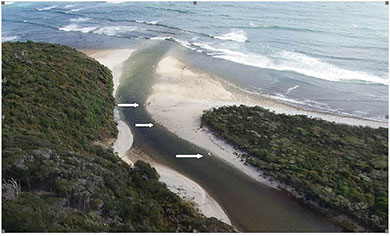Archived content: This media release was accurate on the date of publication.
Date: 03 October 2019
David Egerton, 54, of Otautau, Michael Egerton, 45, of Tuatapere and Allan Rickard, 52, of Cromwell were found guilty of taking native fish (whitebait) from a National Park and possessing nets in Fiordland National Park.

Approximate location of the whitebait nets at the mouth of the Waitutu River
It is an offence under the National Parks Act 1980 to carry out whitebait fishing in a national park without a specific authority.
DOC Principal Ranger Biodiversity in Te Anau Tony Preston says the guilty verdict sends a strong message that flouting the rules is unacceptable.
“Whitebaiting in National Parks without authorisation is illegal. The south coast boundary of Fiordland National Park is the mean high water spring mark which crosses all main rivers, including the Waitutu.
"Over the past couple of years, we have made a concerted effort to communicate exactly where that boundary is to fishers – engaging a surveyor, putting up notices in huts and speaking directly with fishers in the area. There is no room for confusion in regards to where people can and can’t fish.”
During the judge-alone trial DOC presented evidence including survey plans, maps and photos showing exactly where the defendants were found to be fishing, which was clearly above the high water mark, Tony Preston says.
“DOC has been undertaking compliance checks and communicating with fishers in this area for some time now and most people do follow the rules. Ultimately it’s the responsibility of whitebaiters to check they are legal on their chosen river – ignorance is no excuse.”
The penalties for an offence under the National Parks Act include fines up to $100,000, a term of two years’ imprisonment or both. The case was heard by Judge Stephen Harrop on 14 February 2019, with the judgment delivered 30 September. Sentencing for the trio is expected to take place in November.
Background information
Whitebait are juveniles of six species of native fish: giant kōkopu, banded kōkopu, shortjaw kōkopu, inanga, kōaro and common smelt. Those that escape the whitebait net grow into adults ranging from 10 to 60 centimetres long. four of the six whitebait species are categorised as either threatened or at risk of extinction.
DOC administers whitebaiting regulations that cover methods of fishing, location of whitebaiting sites, legal fishing times and net size. Illegal whitebaiting carries a maximum fine of $5000 and whitebaiting equipment can be seized.
Under section 60(1)(h) National Park Act it is an offence to carry out whitebait fishing in national parks without authority.
DOC will be patrolling whitebaiting sites and talking to whitebaiters throughout the season to ensure people are complying with the regulations.
Whitebait information can be found online while Whitebait regulation pamphlets are also available at sporting shops and DOC offices.
Contact
For media enquiries contact:
Email: media@doc.govt.nz